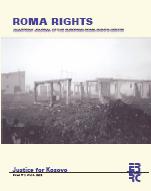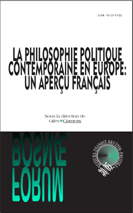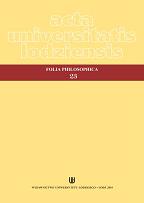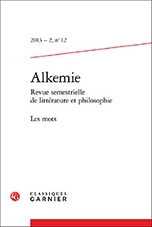


Idoles et fétiches ne sont pas les pires maux qu’on croit, pourvu qu’on sache ce que ces choses nous font faire. À force de séparer nécessité et liberté, nature et société, nous avons oublié la vraie difficulté, celle de la libération en quoi consiste un monde commun possible. Nous faisons les “faitiches” autant qu’ils nous font, comme des médiations. Débarrassé du conditionnement et de la maîtrise, de la dialectique et de la création, l’immense répertoire de nos actions demande à être décliné.
More...
De la perspective herméneutique en philosophie de la religion, on peut tirer un tableau contrasté des données de toute conscience religieuse, même athée. Entre appartenance et mystique, sans écarter humour et folie, cette conscience ainsi comprise dit quelque chose de notre rapport aux réalités contemporaines les plus sombres .
More...
La politique est en réalité une chose rare, parce qu’elle suppose ce qu’on voit en effet rarement, le compte rendu des litiges, des ruptures et des écarts polémiques inscrits dans tout tracé des frontières et des distinctions toujours critiques . avec le règne de l’humanitaire et son consensus, on observe l’éclipse actuelle de la politique .
More...
Dans l’histoire de la philosophie, la pensée s’est longtemps crue autonome ou souveraine, sous les formes de la culture, de l’idée ou du cogito. Il est temps de mettre plutôt en relief le rôle de l’objet, opérateur de tous les changements aussi bien en économie politique que dans la considération de l’école ou de la religion. S’affirme partout une élaboration, seule capable de rendre la pensée à son vrai triomphe, celui de l’objectivité .
More...
Métaphorique, réitératif et résistible: c’est sous ces trois modes qu’un fondement peut préserver les chances d’une fondation concrète. Les termes du conflit religieux recèlent des promesses qu’il s’agit de réactualiser, y compris dans la possibilité de leur abandon.
More...
À partir de la théorie du champ de Pierre Bourdieu et du concept de prophétisme de Max Weber, l’article analyse le mode de politisation des écrivains français. Quatre figures idéaltypiques d’écrivains sont identifiées qui se distinguent tant par leurs conceptions de la littérature que par leurs lieux de sociabilité et les formes de leur engagement politiques: les “notables”, les “esthètes”, les “avant-gardes” et les “polémistes”.
More...

Nous ne cessons d’avoir affaire à tout, alors que la métaphysique semble réduire ce tout à rien en ne s’intéressant qu’à sa naissance ou à sa mort, son fondement ou sa fin. La connaissance totale demeure pourtant vivante: il est temps de redire qu’elle nous stimule, quand nous croyons qu’elle nous dépasse.
More...

Pour la résolution du grand problème des rapports de l’État et de la démocratie, les termes proposés par Karl Popper signalent qu’une société “ouverte” risque fort de remplacer l’avantage de l’indépendance par l’inconvénient de l’isolement. Tel est le défi que doit relever la démocratie locale: l’assemblage, pour les millions d’hommes qui constituent les États modernes, de l’autorité abstraite et du contrôle concret des décisions prises en leur nom .
More...
Égalité et liberté sont les termes d’un problème politique récurrent, que le terrain de la différence sexuelle peut reformuler à nouveau. Le recours aux distinctions conceptuelles classiques, avec leur discussion rationnelle, permet d’évoquer le privilège de l’histoire sur la nature.
More...
Toute demande découvre autant qu’elle recouvre, décèle et cache en même temps . Ce paradoxe est aussi celui de la reconnaissasance, réputée cruciale en notre temps. Il est cependant possible, et pourquoi pas souhaitable, au regard des anciennes théologies de la prière, que nous quittions aussi l’âge de la demande et de la question.
More...
Keywords: Phenomenology; Principle of principles; strictly discursive character of intellect; intellect; Kant
Within the content of the following paper I aim to reveal some epistemological benefits, related to Husserl’s concept of an eidetic intuition. In order to do so, I refer to Kant’s radical division of the subject’s cognitive activity into two main epistemic faculties, namely intuition, which – according to Kant’s statements – may be just empirical, and being strictly and only discursive intellect. Having presented it I further proceed to describe certain difficulties, being the result of the rejection of possibility of an intuitive use of intellect, such as the objective validity of cognizing an apriorical forms, or the process of creating an empirical notions. Finally I refer to Husserl’s acceptation of an eidetic intuition, being – according to my opinion – the only way of solving all the problems presented above.
More...
Keywords: Recens-Arche; philosophy; J. Bańka; Józef; Bańka
In my paper I raised the issue of time and focused on its recentivistic aspect. While discerning physical time from anthropological time I emphasized the meanings of “thymical” time. Such an aspect of time indicates not so much the relation of present time with the human as the direction of the lapse of time. Everything starts from and ends with our “now”, our present as the only existing one. The recentivistic concept of time is a return to the source of philosophy, source of philosophic considerations about the existence in view of contemporary “blurring” of philosophic deliberations. “Escape from the present” drives the humans into the cave of life through the past of the wasted chances or the future of the envisaged successes. The principal thesis of the deliberations conducted says there is no existence, thoughts, world, and, finally, the very human being without recens. Without recens there is even no present which continues the time.
More...
Keywords: Frege; Wittgenstein; correspondent dialogue;
The letters that were found after years are the evidence of hard intellectual work that had been conducted under very infavourable conditions. They refer to the time when Wittgenstein was writing Tractatus while Frege was working on his articles Thought and Negation. Correspondence between Frege and Wittgenstein prove the common will of communication and mutual understanding. Thus remains the question why those two close and well known to each other thinkers have not realized that willingness.
More...
Keywords: St. Augustin; Augustin; paradox of evil; evil
This article is an attempt of representing St. Augustine’s struggle against the greatest problems of Christian ethics, namely, the problem of evil. After the introduction of the philosophical grounds of the problem, we will turn to the outline of the way the Bishop of Hippo has gone through in the quest of the rational explanations for the existence of evil. An analysis of Augustine’s works has shown that he lost his hope to find any sensible answer to this question with the lapse of time, and abandoned himself to an almost blind faith. The Saint leaves us all by ourselves with this anxious question about evil.
More...
Keywords: Fiodor; Dostoyevsky; imperfection; human cognition;
Fiodor Dostoyevsky in his oeuvre indicates certain attitudes, which are often recognized in the process of man’s thinking and behavior. They are conditioned by the manner he perceives reality and they in themselves appoint simultaneously this way of world perception. Some of those occurrences resemble in a great manner the defense mechanisms, which are described in the later literature. A first mechanism that was analyzed is pursue simplification, which causes a man to believe that thanks to the achieved knowledge he will be able to set in order and fix imperfect reality. Such attitude enforces simplified vision of the world, which in turn helps in self-deception. Dostoyevsky’s heroes have problems to recognize true motives of their own behaviors or they intentionally attribute nobler incentives to themselves. Therefore the next described attitude is reluctance to acknowledge the truth. The Russian writer rejects generally accepted disjunctivity of the ‘truth and false’ category and he attributes the final might to acknowledge something as true or false to the man’s will. On account of innate laziness and refractoriness, man chooses the simplest solutions, which in point of fact dismiss possibility to see real reasons for all failures. It makes impossible to undertake activities, which could indeed change something. Man is characterized by irresponsibility for his actions and words. A word looses its causative meaning and becomes purely a decoration, an ornament. All these make that learning the truth, as one of the elements propelling development of the philosophy, was not impossible but it was unwanted.
More...
Keywords: logos; Heraclit; Heraclitean paradoxes; paradox;
The aim of this paper is to present lucid and sympathetic approach to Heraclitean paradoxes. I do not intend to resolve them in terms of Aristotelian logic. Instead, I attempt to reveal their connection with language, their dependence on Greek semantics and syntax. From such a point of view one may eventually see the great significance of language in general as an epistemic guide in Heraclitus’ philosophical investigations.
More...